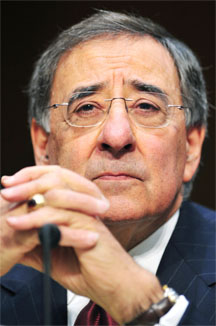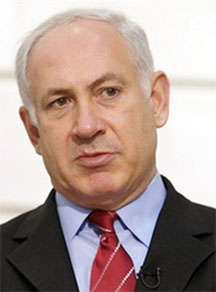JERUSALEM (Reuters) – For all its recent tough talk, Israel looks highly unlikely to launch an attack against Iran ahead of U.S. presidential elections in November, hoping that Washington will ultimately do the heavy lifting.

Leon Panetta
Israeli Prime Minister Benjamin Netanyahu delivered a blunt, public message to US Secretary of Defense Leon Panetta on Wednesday that time was running out to tackle Iran and that US policies to curtail its nuclear programme had so far failed.
An uptick of Israeli rhetoric this summer has fuelled speculation that Netanyahu is poised to follow through on a long-standing threat to attack Iran and destroy nuclear sites that many believe are geared towards creating an atomic bomb.
Iran says its nuclear programme is peaceful and it would retaliate if attacked.
Washington also believes Iran is seeking the ability to make a bomb and says it reserves the right to use force to prevent it, but has urged Israel to allow time for tough new US and EU economic sanctions imposed this year to have an effect.
An array of analysts in Israel see an Israeli strike in coming months as unlikely, pointing to the huge difficulties posed by military action coupled with the political intricacies of defying Wash-ington in the run-up to the US vote.
An Israeli official told Reuters Netanyahu’s inner council, comprising the coalition’s eight top ministers, had not discussed Iran in detail since last year, suggesting there was nothing imminent in the works.
“The octet hasn’t held a proper discussion of Iran for months – since October, as far as I can recall,” said the official, who had been briefed on the closed-door sessions.
“It’s possible that, since then, Iran came up during other sessions, but I wouldn’t count those as serious discussions. You can’t make any concrete decisions or policy advances in an hour-long chat on the sidelines of a different agenda.”

Benjamin Netanyahu
In addition, the official said the octet remained split on the issue, while Israel’s top military and intelligence echelon were “entirely against” launching a unilateral strike on distant and well-fortified Iranian targets that would pose an unprecedented challenge to their forces.
Government spokesman Mark Regev declined to comment on the octet discussions. “This is a confidential forum,” he said.
Caught off guard
Netanyahu said this week that media reports about top-level opposition from past and present security chiefs was “harmful”, while analysts said their reluctance could stay his hand.
“It is very, very difficult to see a situation where a prime minister will go against the advice not just of the former heads of (spy agencies) Mossad and Shin Bet, but most of the military commanders,” said Uzi Rabi, director of the Moshe Dayan Centre for Middle Eastern studies in Tel Aviv.
Conceivably these internal divisions prompted Netanyahu to be particularly outspoken alongside Panetta on Monday, looking to drown out the naysayers with his uncompromising language.
“Neither sanctions nor diplomacy has yet had any impact on Iran’s nuclear weapons programme,” he said, effectively writing off all efforts by President Barack Obama to influence Iran.
Panetta appeared caught off-guard by Netanyahu’s remarks, which came after two days of talks aimed at reassuring Israel that Wash-ington was determined to halt Iran’s nuclear ambitions.
Despite the tone of Netanyahu’s comments, concerns over an imminent Israeli strike have eased in US defence circles since early in the year. American officials also still do not believe that Iran has made the decision to build a nuclear weapon.
Whether or not Iran has actually decided to build a bomb, Israel, widely seen as the only nuclear-armed state in the Middle East, does not want Tehran to possess the capability to do so, a prospect it views as an existential threat.
It says Iran’s nuclear programme must be halted before Tehran is able to defend it well enough to make a military response impossible, a deadline it says is approaching quickly as Iran disperses its capabilities in better-protected sites.
With a less potent air force than the Americans have at their disposal, Israel’s window of opportunity for a damaging strike is more limited, experts say, hence the speculation that the Jewish state must act soon if it wants to be effective.
But not everyone buys into that.
“I believe we have time. I support the American assessment that in four months time, or in half a year it won’t be too late,” said retired Brigadier General Uzi Eilam, senior research fellow at the Institute for National Security Studies (INSS).
“In any case, I don’t believe that Israel should be the only one to lead military action against Iran. It would be much better for the United States to lead it.”
Piling on the
pressure
Top-level Israeli officials have repeatedly questioned the notion that economic sanctions alone might influence Iran, noting that the only time Tehran halted work was shortly after the US invasion of Iraq in 2003, when it feared attack.
It later resumed activities as the US military got progressively bogged down in the Iraq insurgency.
“We need a strong and credible military threat coupled with the sanctions to have a chance to change that situation,” Netanyahu said last Sunday. By extension, Israel will only remain credible if it shows it is ready to follow through on threats.
Amongst those warning against complacency is the ex-Mossad head Efraim Halevy.
“If I were Iranian, I would be very worried about the next 12 weeks,” he told Israel Radio on Thursday.
A recent stream of top-level US officials to Israel, including Panetta and national security adviser Tom Donilon, suggests Washington is eager for first-hand information on its plans, and equally eager to prevent a flare-up before November.
The elections pose both a challenge and a potential opportunity to Netanyahu.
Speaking in May, one senior Israeli figure with close ties to the leadership said he thought the prime minister had decided to attack and saw the run-up to the election as an advantage, believing Obama would be bounced into supporting Netanyahu’s actions under pressure from a largely pro-Israel electorate.
The subsequent consequences of war, including a likely surge in oil prices, could yet impact the outcome of the US ballot, with voters already deeply concerned about the economy.
That could help Obama’s opponent, Mitt Romney, who is ideologically much closer to Netanyahu than the Democratic leader. But would Israel, which is so dependent on US support, risk making such an impact on US domestic politics?
Ephraim Kam, deputy director of Tel Aviv university’s INSS, believes Netanyahu will hold off.
“It would not be healthy for Israeli-US relations to carry out such a significant attack that might influence the election. So my guess is they won’t do it before early November, because it might embarrass the US administration,” he said.
